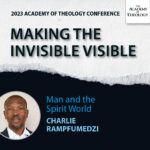Chronic illness, miscarriage, abuse, drug addiction, and even failing at school or university are often associated with a generational curse. Viewing various kinds of suffering as the result of a generational curse is widespread where I live, and across Africa. Linked with that, one tends to also hear much talk about how to break generational curses.
Generational curses are the belief that we inherit judgment for the wrongs committed by our ancestors.
Very simply, generational curses are the belief that individuals inherit judgment for the sins and wrongs committed by their ancestors. Central to this belief is the “curse,” which makes it a weighty topic. For it means that many sufferers consider themselves cursed. Even cursed by God.
Below I argue that God does not punish children for the sins of their fathers; but rather for their own disobedience. Thus much of what we attribute to generational curses are something else, often individual or personal sin. The hope for real change is not in breaking generational curses or deliverance but the God who transforms us from the inside out.
“The Son Shall Not Suffer for the Iniquity of the Father”
From the biblical standpoint, God doesn’t punish children for the sins of their parents or ancestors. He doesn’t punish the new generation for the sins of former generations.
God doesn’t punish children for the sins of their parents or ancestors.
Two biblical texts are helpful here. Firstly, “As I live declares the Lord God, this proverb shall no more be used by you in Israel. Behold all souls are mine; the soul of the father as well as the soul of the son is mine: the soul who sins shall die” (Ezekiel 18:3-4). A few verses later the prophet adds, “The soul who sins shall die. The son shall not suffer for the iniquity of the father, nor the father suffer for the iniquity of the son. The righteousness of the righteous shall be upon himself, and the wickedness of the wicked shall be upon himself” (Ezekiel 18:20).
The exhortation of Ezekiel is that new generations should identity the sins of their ancestors and avoid repeating them. This involves accepting that those who’ve gone before us made mistakes, sometimes massive ones. However, those failures aren’t inherited; the danger is that they’re imitated.
“The Soul Who Sins Shall Die”
Our problems are not the result of our parents or forefathers, ancestors or previous generations. In fact, many of the things that are explained as the result of a generational curse are nothing other than an individual’s sin. Consider substance abuse, sexual immorality, physical abuse, and murder.
Many things considered the result of a generational curse are nothing other than an individual’s sin.
At the same time, all of us suffer from the effects of the fall. This includes disabilities, miscarriages, barrenness, the death of infants, and chronic illness. Tied to that, this life involves many frustrating experiences and challenges: marital strife, accidents, unemployment, low levels of education, losing work, and facing poverty.
On top of the above, that is, things we bring upon ourselves and those that we don’t, is the problem of developing bad and ultimately enslaving habits. Among these are smoking and drinking, gambling, laziness, and even workaholism.
We Need Change, Not to Break Generational Curses
From the above section, it’s obvious that people need to change. Furthermore, everyone wants to change. But we struggle to change alone. This is because we don’t have the power within us to bring about true change. The popularity of breaking generational curses is an attempt to control our lives and bring about this change.
What we need for change has been made available to us through Christ’s redemptive work.
What we need for change has been made available to us through the redemptive work of Christ on the cross. There he died for the sin of not only the generations before and after us, but ourselves too (Colossians 2:14-15). That is the gospel, that God made him who knew no sin to be sin on our behalf (2 Corinthians 5:21). Remarkably, Paul says that through his cursed death on the cross we are redeemed from all and every other curse (Galatians 3:13). By his death he provides freedom and eternal life to everyone who believes, having defeated the powers of evil and darkness (1 John 3:8).
From here to the close of this article, let me suggest a few simple steps towards experiencing real change.
How Do We Change?
You should start by acknowledging that what you call a generational curse isn’t a curse, at least not as far as God is concerned. Rather, it’s a disclosure of the sinful condition which you inherited from Adam. All human beings are conceived and born in sin (Psalm 51:5). The human race is sinful, selfish, rebellious, and morally corrupt (Psalm 53:1-3).
Be honest with yourself, your sin, and the reality of this fallen world.
So every child of Adam is capable of committing the full range of sins mentioned in the Bible. And we can do so without any external influences, whether Satan or a demon or some deceased ancestor. Our sin is our own. We develop sinful habits and enslave ourselves. If you’re always insisting that it’s the fault of a generational curse you’ll never experience actual change. By focusing on supposed external factors we resist internal transformation.
You don’t need to break some generational curse. Instead you need to be honest with yourself, your sin, and the reality of this fallen world.
We Need a Better Perspective Than Victim Mentality
Next, fight against a victim mentality. Stop attributing every single bad thing in your life to someone else. These could very well be your own fault. Take responsibility for your actions and attitudes. Your problems aren’t the sins and mistakes of past generations, but your love of sin.
Stop attributing every single bad thing in your life to someone else.
You think you deserve the best, so you blame other people for all your problems and difficulties, and you hide behind claims of being bewitched or cursed. Yes, your parents could have influenced you differently. And it’s likely that from them you’ve inherited a penchant for certain sins and sinful traits. Don’t, however, let that keep you from taking responsibility for your sinful choices, unwise decisions, and immoral actions.
God will punish you for your sins. That’s what we read in Ezekiel (above). And if your children follow the same lifestyle as you lived, God will also punish them for theirs.
Christ Is the Surest Hope of Change
God commands every generation to put their trust in Jesus Christ, who was made a curse for them. So turn away from sin, sinful behaviour, and bad habits. Turn to Jesus Christ. Put your faith, confidence, and trust in him. There is no need for deliverance. The gospel is the power of God for everyone who believe (Romans 1:16).
Furthermore, every single believer is indwelled by the Holy Spirit (1 Corinthians 6:19-20). God will not share his house with the devil or any other evil forces (2 Corinthians 6:14-16). Christ, who is in you, is greater than the one who is in the world (1 John 4:4). He is our only hope of change and progress.











